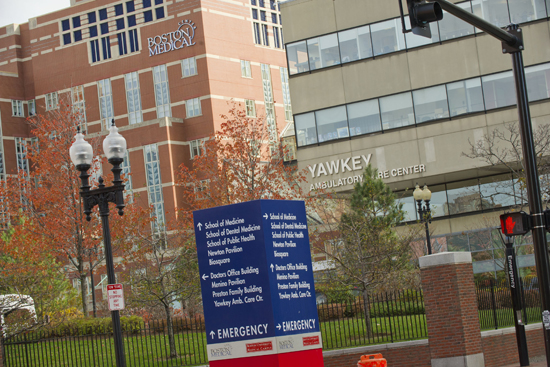Lab Worker Infected with Bacteria Now Recovering
School of Medicine and Boston Public Health Commission examine lab, review policies

Photo by Kalman Zabarsky
A researcher at the BU School of Medicine became ill last weekend after being infected with the bacterium Neisseria meningitidis, which he had been studying in a BioSafety Level 2 laboratory. MED spokespeople say the researcher, whose identity has not been disclosed, does not have meningitis, but is infected with a bacterium that can cause the disease. Thomas Moore, Medical Campus associate provost, says the researcher is responding well to antibiotics and is expected to make a full recovery.
The School of Medicine reports that the following actions have been taken:
- The Boston Public Health Commission (BPHC) was notified in a timely fashion.
- All laboratory personnel who worked with the researcher have been examined and given antibiotics.
- Others on the Medical Campus who may have had contact with the researcher have been notified and directed to seek treatment if they develop symptoms.
- The laboratory has been decontaminated, with all activities and procedures reviewed.
- The BPHC has been asked to inspect the laboratory and review all procedures; an initial independent inspection by BPHC took place yesterday afternoon, October 29.
Moore says the researcher began feeling ill over the weekend, saw a physician on Sunday, and tested negative for influenza. Further tests revealed a bloodstream infection consistent with the type of bacteria being studied at the laboratory. It remains unclear how the bacterium entered the researcher’s body, but spokespeople say the most common means of human infection is inhalation.
Neisseria meningitidis is a bacterium that can be killed with antibiotics, but for which there is no vaccine for the strain being studied. It is best known for its role in bacterial meningitis and other forms of meningococcal disease, such as meningococcemia. It exists in the nose and throat of 5 to 15 percent of normal adults and is the cause of the only form of bacterial meningitis known to spread in epidemic form.
Meningococcus is spread through saliva and other respiratory secretions exchanged when coughing, kissing, chewing on toys, and the like. Meningococcal meningitis can rapidly progress from initial general symptoms like fatigue, fever, headache, and neck stiffness to coma, and in about 10 percent of cases, death.
Art Jahnke can be reached at jahnke@bu.edu.
Comments & Discussion
Boston University moderates comments to facilitate an informed, substantive, civil conversation. Abusive, profane, self-promotional, misleading, incoherent or off-topic comments will be rejected. Moderators are staffed during regular business hours (EST) and can only accept comments written in English. Statistics or facts must include a citation or a link to the citation.